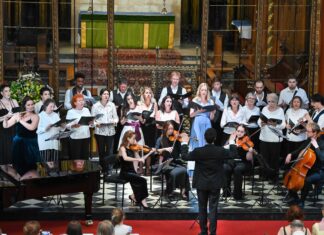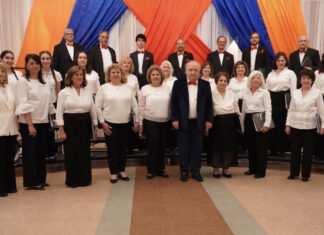By Aram Arkun
Mirror-Spectator Staff
NEW YORK — Gerald Papasian, like many intellectuals, is a man with a mission. In his case, the mission is to keep Western Armenian culture alive, and as an actor himself, his focus is on theater and opera. At two lively events held in Manhattan on December 13 and 17, Papasian brought to the attention of Americans, and in particular Armenian-Americans, his effort to revive a 19th-century operetta called “Gariné” (known originally as Leblebiji Horhor Agha), written by Dikran Chukhajian [or Tchouhadjian; 1837-98].
At the first event, a fundraiser cocktail party, some 30 people gathered at a Greek restaurant, Kellari Parea Bistro, in order to learn about the project and watch a video excerpt of a recent performance of “Gariné” in Paris, France. The evening took place under the joint auspices of Archbishop Khajag Barsamian, Primate of the Diocese of the Armenian Church of America (Eastern), and Ambassador Garen Nazarian, Permanent Representative of the Republic of Armenia to the United Nations, with the support of the Tekeyan Cultural Association and the chairman of its greater New York chapter, Hagop Vartivarian.
Barsamian spoke of the importance of bringing the “hidden” treasures of Armenian culture to a greater audience, while Nazarian declared that he would be happy to help Papasian bring productions of “Gariné” to the US and Armenia.
The second event was hosted by Alwan for the Arts, an organization that showcases the art and culture of the Middle East and North Africa. Here, not only did Papasian explain to a crowd of more than 40 the work involved in reviving “Gariné” and present the video excerpt, but in addition, soprano Christine Moore, and tenor Aram Tchobanian sang four arias and duets from the operetta, accompanied by pianist Sofya Melikyan, and joined in one excerpt by Papasian himself. Moore, born to an Egyptian mother of Lebanese and Armenian extraction and an American father, has performed many roles, including Mimi in “La Bohème” with the Leipzig Opera, Micaëla in “Carmen” with the Sacramento Opera, “Madama Butterfly” with the Central City Opera, Alice Ford in “Falstaff,” the title role in “Suor Angelica,” Donna Anna in “Don Giovanni” and the Countess in “Le Nozze di Figaro.”
Aram Tchobanian has premiered numerous operatic and chamber works by such composers as Thomas Cipullo, Yoav Gal, Martin Halpern, Jakov Jakoulov, Thomas Pasatieri, Marga Richter, Salvatore Sciarrino and Ben Yarmolinsky. Melikyan, born in Yerevan and a member of ima Piano Trio, has toured through many countries of Europe and much of the US. The three only had a very short time for rehearsal before this event, but nonetheless, managed to give the audience a tantalizing glimpse into the possibilities of this comic opera.







